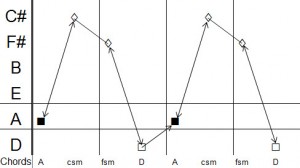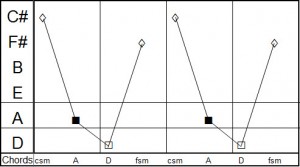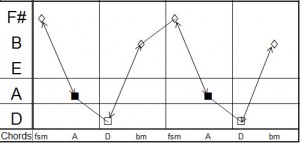Somebody like you – Adele – Part 2
Ok so now this song is stuck in my head, it got me thinking about relative minors. What would happen to this song if you swapped all the chords for their relative majors/minors. It is one of the simplest substitutions you can use so lets have a listen.
Firstly lets hear the original verse:. The chords reapeat around A-c#m-f#m-D.
Now, if we swap all of those chords for their relative majors/minors, we get this instead:
However, there are some other chords that will serve just as well for relative majors and minors. We are often told that there is only one relative major or minor, but this is not the case. Take C major for example. Music theory tells us that the relative minor is A minor. Sure enough, their chords and scale are very similar, so it is easy to see the relationship. However, there is another minor chord very similar to C major, and tha is E minor. The similarities are not so exact in the scale, but for a chord substitution it is perfectly valid.
What happens to our tune if we substitute these chords instead?:
Neither of the new chord progressions sound quite right as we are so used to hearing the original, and the fact that the tune fits perfectly over the original chords. However if we could pick and choose from these substitutions…
In my opinion this sounds just as solid as the original sequence, even though none of the original chords appear in the same position. This shows the power of relative majors and minors and of substitutions. Many songs and songwriters use substituted chords to chage up their progressions. Give it a go, you might find that it creates that moment of magic you were looking for!
This entry was posted on Monday, January 16th, 2012 at 10:07 am and is filed under song analysis, Songwriting. You can follow any responses to this entry through the RSS 2.0 feed. Both comments and pings are currently closed.
Related Posts
- No related posts found.
Sorry, the comment form is closed at this time.



